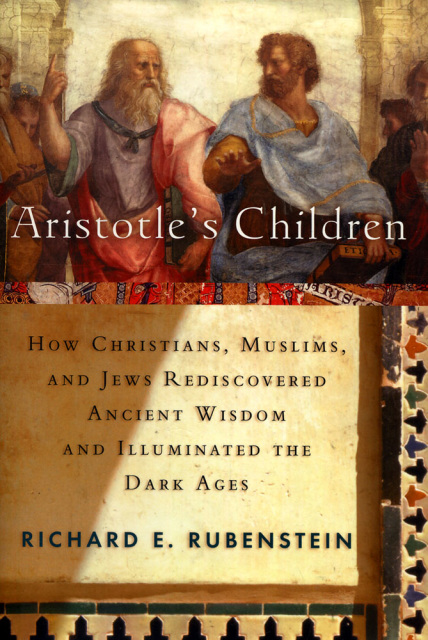ARISTOTLE'S CHILDREN: HOW CHRISTIANS, MUSLIMS, AND JEWS REDISCOVERED ANCIENT WISDOM AND ILLUMINATED THE DARK AGES by Richard E. Rubenstein
SKU:
$13.00
$13.00
Unavailable
per item
Aristotle’s Children: How Christians, Muslims, and Jews Rediscovered Ancient Wisdom and Illuminated the Dark Ages by Richard E. Rubenstein
This book documents the intellectual explosion that transformed Europe in the Middle Ages and follows a set of ideas as they course through the West. These ideas triggered student riots and heresy trials, prompted Pope Innocent III to recognize the Franciscan and Dominican orders, and set the stage for today’s rift between reason and religion.
This new perspective came from Aristotle. His work, like the rest of Greek culture, had been lost in the centuries after the fall of Rome, when the Greek language was forgotten. But in the Muslim world, the wisdom of the Greeks was never lost and contributed to the flowering of Islamic culture.
Then in the twelfth century in Toledo, Spain, groups of Muslim, Christian, and Jewish scholars collaborated on translating the ancient classics; and ideas long forgotten galvanized Europe, turning Western thinking away from the supernatural world and toward the world of nature. With their optimistic view of human nature, these concepts sparked fierce controversies in the universities and caused major changes in the Catholic Church.
Richard Rubenstein, author of When Jesus Became God, takes the reader back in time to the translation center in Toledo and to the great universities in Paris, Padua, and Oxford. He shows how the Catholic Church adopted this new philosophy and struggled to reconcile science and religion and how Western thinking was set on the path it has followed ever since.
This is a feast for readers who are fascinated by medieval history, and a treat for all who want to understand the ideas that are fundamental to modern thought.
Harcourt, Hardcover, 1st Edition, 1st Printing, 2003, 368 pages
This is a USED BOOK in Like New condition. The dust wrapper is also in Like New condition.
This book documents the intellectual explosion that transformed Europe in the Middle Ages and follows a set of ideas as they course through the West. These ideas triggered student riots and heresy trials, prompted Pope Innocent III to recognize the Franciscan and Dominican orders, and set the stage for today’s rift between reason and religion.
This new perspective came from Aristotle. His work, like the rest of Greek culture, had been lost in the centuries after the fall of Rome, when the Greek language was forgotten. But in the Muslim world, the wisdom of the Greeks was never lost and contributed to the flowering of Islamic culture.
Then in the twelfth century in Toledo, Spain, groups of Muslim, Christian, and Jewish scholars collaborated on translating the ancient classics; and ideas long forgotten galvanized Europe, turning Western thinking away from the supernatural world and toward the world of nature. With their optimistic view of human nature, these concepts sparked fierce controversies in the universities and caused major changes in the Catholic Church.
Richard Rubenstein, author of When Jesus Became God, takes the reader back in time to the translation center in Toledo and to the great universities in Paris, Padua, and Oxford. He shows how the Catholic Church adopted this new philosophy and struggled to reconcile science and religion and how Western thinking was set on the path it has followed ever since.
This is a feast for readers who are fascinated by medieval history, and a treat for all who want to understand the ideas that are fundamental to modern thought.
Harcourt, Hardcover, 1st Edition, 1st Printing, 2003, 368 pages
This is a USED BOOK in Like New condition. The dust wrapper is also in Like New condition.
1 available
